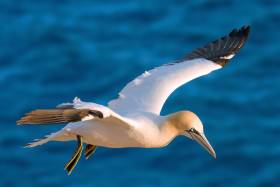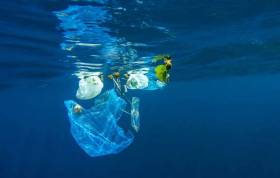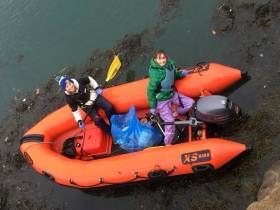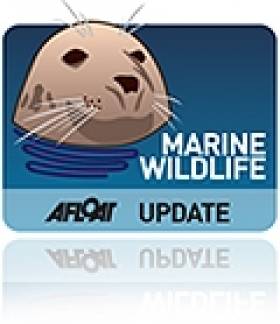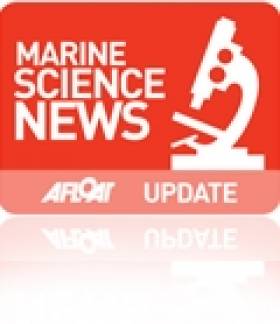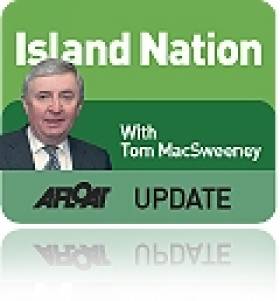Displaying items by tag: plastic
Plastic Problem For Gannets On Little Skellig
#MarineWildlife - Concerns have been raised over the levels of plastic pollution at an important gannet colony on the smallest of the Skellig Islands.
As The Irish Times reports, discarded plastic waste – including parts of old fishing gear in the Atlantic for more than a decade – now comprises a large proportion of the material used by some 70,000 gannets to build their nests on Little Skellig.
And conservationists fear the problem is being ignored by authorities focused on marketing nearby Skellig Michael to tourists based on it appearance in recent Star Wars films.
“I film marine life underwater [and] it’s very difficult to get a frame without plastic in it, and that wasn’t an issue 15 years ago,” said local filmmaker Vincent Hyland, who added that plastic pollution levels had reached “frightening proportions” in the last year.
The Irish Times has more on the story HERE.
More Plastic Than Fish in Our Oceans by 2050 – UN Report
Sinn Féin MEP Liadh Ní Riada has warned there will be more plastic waste in our oceans than fish by 2050, according to a UN report.
The Ireland South MEP gave the stark warning as she addressed the European Parliament on the urgent need to tackle plastic pollution.
Ms Ní Riada, who sits on the EU Fisheries Committee, said we all had to take responsibility for the problem, citing Ireland as one of the worst polluting offenders.
“Plastic pollution is affecting marine life in even the most remote parts of the Atlantic Ocean,” she said.
“Almost three quarters of a sample of more than 230 deep water fish collected by NUI Galway scientists had ingested plastic particles.
“However, it's important we recognise that it is not the fisheries that are solely responsible for this but they are part of the answer. Indeed, fisheries were, in my view, the first environmentalists; they had to be in order to maintain and sustain a living.
“We have to tackle this issue now, as a matter of urgency. Already we have seen reports predicting that there will be more plastic waste than fish in our oceans by 2050.
“To treat this as anything other than an emergency is to condemn future generations to dying oceans and a corrupted environment.
“The issue, like the oceans it's affecting, can seem so vast that it is beyond our ability to act but there are practical solutions that we can apply.
“Education, for example, is key in this and the Polluter Pays Principle has to come into effect.
“Manufacturers must take responsibility and ownership of the fact that they are producing these vast amounts of plastic, be it nets or be it in the ordinary every day use of things like plastic bottles.
“We all use plastic on so many different levels and we all have to be individually responsible for our own use but if we are to begin undoing the damage that we have cause to our oceans then manufacturers must play a key role.
“Looking at the extension of initiatives such as the Litter Scheme may also help. Incentivising fisheries to grab in the ghost nets is a positive move but we should examine extending that a bit further and invest more in our fisheries to try and incentivise them to gather up plastic as they're fishing.
“We also need to look at plastic recycling and how that feeds into the circular economy.
“There are many positive things in today's report. I look forward to examining it and putting forward some of my own amendments.
“But let there be no doubt about how big this issue is and how crucial it is that we all accept our responsibility in having contributed to it.
“For example, I'm ashamed to say that Ireland is one of the top polluters and that's not a record that we're proud of.
“As an Irish person, as an Irish MEP I am more than willing to get stuck into this issue to see can we tackle it once and for all, both the existing problem and the future problems that its going to cause.”
How One Girl Is Leading The Fight Against Litter In Dublin Bay
#DublinBay - Litter in the water is a longstanding issue in Dun Laoghaire and Sandycove — but one local schoolgirl has taken it upon herself to do something about it.
Ten-year-old Flossie Donnelly started this past summer calling for volunteers to help clean up the sea shore at Sandycove every Friday evening, even designing her own poster to spread the word on social media and around the neighbourhood.
On her blog, Flossie writes that she was “really sad” that no one came to her first clean-up.
But a meeting at the Forty Foot the next day with county councillor Cormac Devlin led to the word spreading further in the local press.
“It’s very unusual that a child of her age approached an adult and a politician at that. That she is so environmentally aware is wonderful,” Cllr Devlin told the Dublin People in August.
By the end of the summer, Flossie was in charge of her own crew of volunteers helping to remove plastic debris that is dangerous to Dublin Bay’s marine life and local boaters alike.
Despite the shorter days and colder weather of late autumn and winter, Flossie is still leading regular coastal clean-ups and making friends along the way — including an Australian girl whose message she found in a bottle.
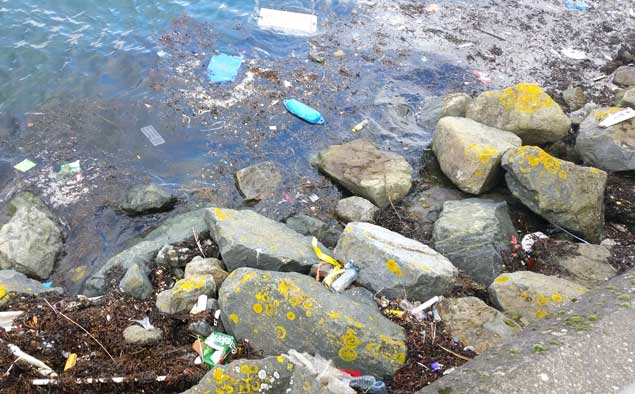 Marine debris in Dun Laoghaire
Marine debris in Dun Laoghaire
More recently, Flossie was out on a RIB in Dun Laoghaire Harbour to clean up the breakwaters — filling three boats with rubbish and doing “a week’s work in a day”, according to Dun Laoghaire Coast Guard, who praised the “inspirational” girl for her efforts.
But the ambitious youngster isn’t stopping there, with plans to raise money for the installation of a Seabin automated cleaning system for the harbour, in what would be a first for Ireland.
Previously highlighted during Afloat.ie’s Rio Olympics coverage last year, the Seabin device has the potential to collect as many as 83,000 plastic bags or 20,000 plastic bottles each year.
That amounts to half a tonne of plastic annually, from visible debris to micro-plastics that threaten our protected species.
Britain’s first Seabin was recently installed at the pontoon of America’s Cup team Land Rover BAR in Portsmouth as part of a project to restore populations of oysters in the Solent.
Flossie and her beach cleaning squad will be hosting a table quiz at Fitzgerald’s Pub in Sandycove next Thursday 30 November to raise funds towards Dublin Bay’s first Seabin. For details see Flossie’s website HERE.
The EU should review the materials used in plastic bag manufacture and encourage greater usage of biodegradable carrier bags to prevent further marine environmental damage, according to Jim Higgins MEP, following a vote by the European Parliament on the issue this week.
This week, MEPs backed ambitious targets which will oblige Member States to reduce their use of light plastic bags, first by half, and then up to 80 per cent as compared to the average EU consumption in 2010 within at least 5 years.
This is good news for the marine environment according to MEP Higgins: "60-80 per cent of all marine litter is plastic material, scattered across all the world's oceans. The seabed closest to coastal regions can be most contaminated, especially with debris from carrier bags.
"The sheer volume of plastic waste and its durability is causing havoc for marine life which gets entangled in it or ingests the debris. There is also some evidence to suggest that chemicals from the materials present a toxic hazard for marine life and seawater quality.
"The durability and hard-wearing nature of plastic that makes it so useful also makes it problematic for environmental reasons as it takes so long to degrade. While some initiatives to reduce our reliance on plastic and increase recycling are positive, such as the plastic bag charge and more reusable shopping bags, we need to review the actual materials being used by manufacturers," Mr Higgins continued.
"An in-depth study by the University of Plymouth on the degradation of plastic carrier bags in a realistic marine environment showed that compostable plastic disappeared between 16-24 weeks, whereas 98 per cent of all other plastic remained after 40 weeks. One possible remedy proposed by the scientists behind the study is increasing our use of biodegradable carrier bags."
The Midlands North West MEP highlighted a recent success story in Italy: "Thanks to the use of biodegradable-compostable bags combined with a restriction of other types of bags, Italy has halved its plastic bag consumption since 2011. This is a trend that could apply to the entire EU under the right conditions."
Pioneering Plan To Recycle Plastic Waste From The Sea
#MarineScience - A green cleaning brand plans to use science to recycle plastic waste from the sea in the production of a new type of sustainable plastic bottle.
The Guardian reports that Belgian firm Ecover is working with plastic manufacturer Logoplaste to combine plastic taken from the sea with recycled plastic and a type of plastic made from sugar cane known as Plantastic.
Chief executive Philip Malmberg said: "We won't have a definitive figure on the amount we will retrieve, we are just hoping to get as much as is possible and give fishermen an incentive to join the initiative and help clean the seas."
Plastic waste accounts for almost 60% of all litter on Britain's beaches, according to stats from the Marine Conservation Society - and can also cause great harm to marine wildlife, after recent reports that a sperm whale washed up dead in Spain had swallowed 17kg of plastic waste dumped by farmers growing vegetables for UK supermarkets.
It's hoped that boats can be outfitted with special equipment that will allow them to collect up to eight tonnes of plastic waste for recycling - and that fishermen can deposit any plastic they collect at designated points.
The Guardian has much more on the story HERE.
Conference Hopes to Bin Ocean Debris
It was very topical, because this week the Fifth International Marine Debris Conference is taking place in Hawaii, organised jointly by the National Oceanic and Atmospheric Administration and the United Nations Environment Programme. This is an attempt to deal with the increasing problem of debris in the oceans of the world.
A United Nations report revealed some pretty frightening facts to the conference. Just two kinds of rubbish make up more than half the marine debris in the world. One is predictable enough – the horror of plastic choking sea life. The other came as more of a shock. The second most abundant kind of marine litter is smoking-related. Cigarette butts and packing account for nearly half of all sea rubbish in some parts of the world, according to the UN.
About 40 per cent of the litter in the Mediterranean Sea comes from this source. In Ecuador, smoking-related refuse accounted for more than half of coastal rubbish.
Ocean debris is a severe threat to the marine eco system. It kills at least 1 million sea birds and 100, 000 mammals each year, according to the United States National Oceanic and Atmospheric Association. The general prognosis at the conference in Hawaii has been pretty grim. Things are getting worse and it is the fault of humans on land using the oceans as rubbish dumps.
As my grandson's homework showed, it takes two weeks for a bit of fruit thrown into a river or the sea to bio-degrade. It will be two months before a piece of cardboard breaks down, three months for a milk carton and matters get worse where a cigarette butt is concerned. That will take ten years to disintegrate, a Styrofoam coffee cup 50 years, a plastic bag over a hundred and the six-pack ring so often tossed overboard from boats 400 years, with the plastic bottle even worse at 450 years.
The threat and impact of marine debris have long been ignored. Perhaps it is the perceived vastness of the ocean and lack of visibility of marine debris, but the teachers in Crosshaven national school, on the edge of Cork Harbour deserve praise for making their young pupils aware of what throwing litter into a river or dumping it on a beach does.



























